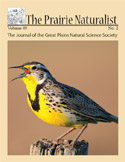Great Plains Natural Science Society

The Prairie Naturalist
Date of this Version
6-2013
Document Type
Article
Citation
The Prairie Naturalist 45:46–56; 2013
Abstract
Deerfield Reservoir in the Black Hills of South Dakota and its tributary system are managed as hatchery supplemented rainbow trout (Oncorhynchus mykiss) fisheries. Three genetically unique strains of rainbow trout (Shasta, Erwin and McConaughy) are stocked into the system. Recently, juvenile rainbow trout of unknown origin were collected in the tributary system above Deerfield Reservoir, indicating potential natural reproduction. Understanding the genetic origins and ability of these rainbow trout to contribute to the fishery is essential in determining the proper management strategy for these waters. Our objectives were to 1) evaluate the genetic origins of potentially naturally reproduced rainbow trout in Castle Creek and South Fork Castle Creek, 2) evaluate the contribution of potentially naturally reproduced rainbow trout to Deerfield Reservoir, and 3) evaluate the movements of stocked rainbow trout between Deerfield Reservoir and its tributary system. Microsatellite DNA analysis of naturally reproduced fish indicated that genetic material was primarily contributed by Erwin and McConaughy strain rainbow trout. Logistic regression analysis was used to develop a predictive model for known wild and known hatchery fish based on scale circuli growth characteristics. Logistic regression indicated that approximately 50% of the unknown origin fish were of wild origin. Finally, adfluvial movements by the three strains of rainbow trout from Deerfield Reservoir were evaluated using passive integrated transponder (PIT) technology. McConaughy strain fish exhibited the highest proportion of tagged individuals moving upstream followed by Erwin and Shasta strains, respectively. Knowledge of the origins of the genetic background for naturally reproduced rainbow trout as well as their ability to contribute to the sport fishery is essential to determine the appropriate fisheries management strategy for the Deerfield Reservoir system.
Included in
Biodiversity Commons, Botany Commons, Ecology and Evolutionary Biology Commons, Natural Resources and Conservation Commons, Systems Biology Commons, Weed Science Commons


Comments
Published by the Great Plains Natural Science Society. Used by permission.